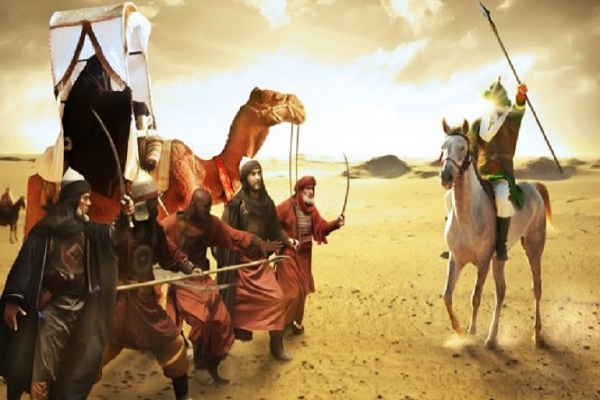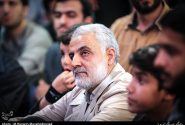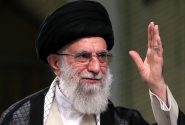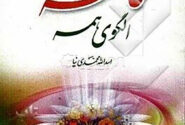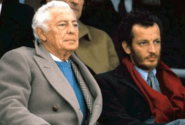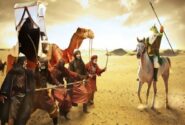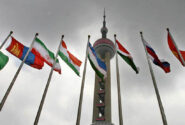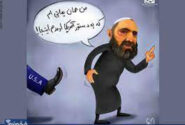One of the aspects of the evolution of Islam is its conscious presence in social and political scenes and the invitation of God’s servants to be actively present in all scenes of life. Islam invites everyone to stay away from seclusion and monasticism and participate in political and social activities, and at the same time, it informs people about the harm, difficulties and sorrows of this presence, so that neglect does not cause them to fall into the valleys of destruction. and go astray.
One of the Islamic warnings is the warning against sedition in social scenes. Fitna, which is more meaningful in the word “trial”, is first of all a Quranic concept. We read in the Holy Quran: “According to the people, let them say that they believe, and they will not be tempted, and those who are before them will be tempted, so God will teach us the righteous and let us teach the liars (1); Did people think that they will be released and will not be tested until they say they believed? Indeed, We tested those who were before them so that God knows those who have spoken the truth and knows the liars. We read in Surah Furqan: “And We have sent before you the Messengers, except that they eat food and walk in the markets, and We have made among you some temptations. Be patient and be wise.” And We did not send (our) prophets before you, except that they (also) ate and walked in the markets, and We made some of you a test for others. are you patient And your Lord is ever-seeing. We also read in Surah Momtahnah: “Our Lord, do not make us fitnah for those who disbelieve and forgive us, for You are the Most Gracious, the Wise (3); O Lord, do not make us a means of trial (and a target of persecution) for those who have disbelieved, and forgive us, as You are able to measure.
In our narrative and hadith culture, the subject of sedition has been discussed a lot. It is possible to refer to the words of Amir Mominan in describing the conditions of the people before the coming of the Holy Prophet (PBUH): “At that time, the people were caught in seditions in which the thread of religion was torn apart and the shaky pillars of certainty… They obeyed Satan and followed his ways and drank from his fountains. With their help, his flags were flying everywhere. They had fallen into intrigues that crushed them under his hoofs and trampled them under his feet. These seditions (like a rebellious horse) stood on their feet and everyone was confused, confused, ignorant and trapped in these seditions” (4). He also said: “None of you should say: O God, I seek refuge in you from fitna; Because there is no one who is exempt from temptation (and trial); Rather, the one who takes refuge in God (from conspiracy), must seek refuge in God from misleading intrigues” (5). He considers the origin of seditions to be following the whims of the soul and rulings that are heresy: “There is no other way than that the origin of seditions is following the whims of the soul and rulings that are heretical and are against God’s decree, and a group of people in these desires And heretics follow another group. Know that if the truth were pure and uniform, it would not be hidden from a wise person, but a handful of both would be taken, and a handful of this and a handful of that would be mixed together, and this is where Satan dominates his friends and those who They are saved by the grace of truth. I heard from the Prophet of God that he said: How will you be when a fitna overtakes you in which a minor grows up and an adult grows old?…” (6).
The question of how much and how much sedition has been raised in the age of Shiite imams; As the Commander of the Faithful, Ali (a.s.) declared in a sermon in Nahrvan that he had removed the eye of sedition and no one but him had the courage to do so. After the imam’s speech, a man gets up and asks the imam to speak about seditions. Imam replied: “Indeed, seditions are suspicious when they occur, and when they disappear, they make you aware and alert. When they come, they make right and wrong suspicious, and when they leave, they are recognized. Seditions move like whirlwinds and hit a city (on their way) and do not pass through a city. Know that in my opinion, the most terrible fitna that is happening to you is the fitna of Bani Umayyad (7)”.
Many people seeking wellness refer to this noble hadith when seditions occur: “Kun in the fitna of Kaban-e-al-Labun, Lazahor Fayorkab and Ladree Fayuhlab (8); At the time of temptation, be like a two-year-old male camel that has neither the back nor the strength to ride on it, nor the udder to milk it.” By reflecting on this noble hadith, it becomes clear that the meaning is not to seek wellness and withdraw from accidents and seditions! Rather, it means that the believer should be careful that the seditionists cannot take advantage of him and trap him. If the hadith is interpreted as recommending seclusion, it will be in conflict with the provisions of the verses of the Holy Quran and the traditions of the infallibles (pbuh) regarding the necessity of the presence of the believer in social and political scenes, enjoining the good and forbidding the evil, etc. The victory of disbelievers and hypocrites will end; Because their goal of sedition is to win and dominate the believers. Therefore, it should be known that when seditions occur, seclusion and austerity are not worthy of true believers; Rather, they should prevent seditionists in theoretical and scientific fields with full insight and protect the sanctity of religion and Sharia.
What happened was a brief look at the views of the Holy Qur’an and the Infallibles (PBUH) about sedition and its derivatives. Now we are going to the main topic – investigating the issue of sedition in the battle of Jamel. Dealing with this issue requires mentioning a part of the story of this important battle and the causes of its occurrence, which we are now dealing with
The face of the seditionists
In the Battle of Jamal, Ali (a.s.) faced those who claimed to be Muslims and leaders in Islam. Some of the leaders of sedition in this war had a very positive background at the head of Islam and were very popular. Ali (a.s.) himself calculates the characteristic curve of his opponents in the Battle of Jamal as follows: “I swear to God! I was caught by four people who have not been caught like them after the Prophet (PBUH). I was infected with the bravest people: Zubair bin Awam; And the trickiest people: Talha bin Obaidullah; And the most obedient people among people: Aisha, daughter of Abu Bakr; And the one who helped me with various dinars: Ya’ali bin Munniyeh” (9). Considering the various characteristics of people in this battle, as well as the brilliant background of some of them, it is necessary to first examine the lives and thoughts of the leaders of Fitna in this battle:
۱٫ Aisha
She was the daughter of Abu Bakr and the wife of the Prophet of Islam (PBUH), who was no more than eighteen years old at the time of the Prophet’s death (10). He was highly respected during the time of Abu Bakr and Omar; But this was not the case in the era of Osman. Uthman did not pay much attention to him and spent his efforts so that the Umayyads would gain respect and closeness. Uthman’s lack of importance to him caused hatred and obscurity to the extent that Aisha incited people against Uthman and said: “Oktuluwa nathala, faqad kafar (11); Kill the ignorant old man who is a disbeliever.” The rebels had surrounded Osman’s house when Aisha decided to go to Mecca. He stayed in Mecca until Uthman was killed. Aisha was happy; What’s more, he thought that Talha (12) or Zubair (13) would become caliphs after Usman, and Aisha would regain the honor and closeness she once had. Therefore, he went to Medina. In the middle of the way, the news reached him that Ali (a.s.) had become Caliph. Ayesha had more grudge against Ali than Uthman. He returned from the halfway point and in Makkah raised the blood lust of Uthman (14).
Ayesha was an eloquent and literate woman (15) and because of her familiarity with the Arab spirit, she knew their weaknesses very well; Therefore, he was able to provoke them (16). Talha and Zubair knew this issue and thought that because of the popularity of Ayesha in the eyes of the people as the wife of the Prophet, they could inspire the people and gather a lot of power. Ayesha was the battlefield in the Battle of Jamel, after Talha and Zubair were killed. Despite all this, the Imam returned him to Madinah with all respect. After the martyrdom of Imam Ali (a.s.), he expressed his happiness and even made a prostration of gratitude (17). He prevented the burial of Imam Hassan Mojtabi (a.s.) next to the Prophet of God (18). Ayesha passed away in the year fifty-seven or fifty-eight Hijri (19).
۲٫ Talha bin Obaidullah
He was considered one of the pioneers in Islam and one of the great companions of the Prophet (20). Before the emigration, between him and Zubair, a brotherhood was concluded (21). His profession was business, and during the Badr war, he had gone to Syria for business. (22) . The Ahl al-Sunni people considered him to be one of the evangelical ten (23). The caliphs after the Prophet honored him until Omar made him a member of his council of six; But he resigned from the caliphate in favor of Uthman. A lot of intelligence, politics and a lot of wealth – especially through Uthman – were his characteristics. One day, Uthman forgave his debt of fifty thousand dirhams to the treasury and said: To help your chivalry! (24) His remaining wealth was estimated at thirty million dirhams (25). Despite all this, Uthman had turned his attention to the Umayyads and therefore, he did not grant Talha a Musnadi, and perhaps this contributed greatly to the emergence of his differences with Uthman (26).
He himself claimed caliphate and even wrote letters to Basra, Kufa and other areas and incited people to kill Uthman (27). Before Uthman was killed, he had taken control of the treasury (28); Despite all this, due to the accusation of participating in the murder of Uthman, he could not officially claim the caliphate and therefore pledged allegiance to Imam Ali (a.s.) and was even the first to pledge allegiance, but finally in the year 36 of Hijri, in the Battle of Jamal and was killed He was killed by an arrow from the back of the head by Marwan bin Hakem (29).
۳٫ Zubair bin Awwam
He was the cousin of the Prophet of Islam (PBUH) and Imam Ali (PBUH) and he was the fourth or fifth person to convert to Islam (30). Courage and participation in all the wars of the Prophet (PBUH) and being injured several times were the characteristics of Zubair. He is also considered by the Sunni men as one of the evangelical ten (31). Even though Zubair was the son-in-law of Abu Bakr, he refused to pledge allegiance to him and became one of the companions of Imam Ali (AS). Therefore, he shared some of his sayings in the burial of Fatima Zahra (PBUH) (32). He was also one of the members of the six-member council that Omar had nominated for the caliphate. But Zubair stepped down in favor of the Amir of the Believers, Ali (AS). Imam Ali (AS) said about Zubair: “Zubair was always one of our Ahl al-Bayt until his unfortunate son Abdullah grew up (33)”. Zubair also gained a lot of wealth during the era of Osman: Fifty thousand dinars, one thousand horses, and one thousand slaves and maids were Zubair’s capital at the time of his death (34). However, Uthman did not give him a position either. Therefore, his relations with the third caliph became cold and finally he wanted to kill Uthman. After that, he pledged allegiance to Ali (a.s.) (35), but because Imam did not grant him a position, he quickly became one of Imam’s opponents. His provocateur was his son Abdullah. After talking with Imam Ali (AS), Zubair withdrew from the war, but was killed by Abi Jermuz (36).
۴٫ Abdullah bin Zubair
He was born in Madinah in the first year of Hijri, and he is the first child of the emigrants who was born in Madinah (37). He was the grandson of Abu Bakr, who was very effective in deviating his father. After the murder of Uthman, he tried hard to bring his father to the caliphate, but failed. Also, he was the link between Ayesha (who was his aunt), Talha and Zubair (38). After the end of the war, according to Aisha’s request, Imam pardoned her (39). He was a despised and arrogant person to the extent that Muawiyah did not care much about him (40). He did not pledge allegiance to Yazid and settled in Mecca and later gained control over it. Yazid’s army attacked Mecca to destroy him. In this attack, the Kaaba caught fire and was destroyed. This attack was a continuation of the Harrah incident. However, the news of Yazid’s death reached Mecca and Abdullah survived (41). After Yazid – in 64 Hijri – he claimed the caliphate and dominated Hijaz, Yemen, Iraq and Khorasan. He demanded allegiance from Abdullah bin Abbas and Muhammad bin Hanafia and after avoiding them, he decided to kill them, but they were saved by the attack of Mukhtar’s troops (42). Abdullah bin Zubair was finally killed in the seventy-third year of Hijri – during the caliphate of Abdul Mulak bin Marwan – by the attack of pilgrims on Mecca and the Grand Mosque, and then he was hanged (43).
۵٫ Marwan bin Hakam
He is one of the hated and seditious faces of Islam. He is the most worthy proof of the existence of those who do not believe in Islam from the heart and only observe its appearances and, when necessary, strike at it. Marwan was from the Umayyad family and the cousin of Osman. He was born in Makkah or Taif. The Prophet of God had exiled his father – Hakam bin Al-Aas – to Taif for causing sedition and mocking Islam. He was also with his father in Taif and did not see the Prophet of God (44). Even the first and second caliphs did not allow Marwan and his father to leave exile; But Uthman, while restoring many honors, granted them many properties and appointed Marwan as his secretary and the main leader of the government (45). He was a raw young man and had no use of Islamic social etiquette; Since the beginning of his life, he had lived outside Medina and as an exile. The blow on the back of his neck caused his neck to bend and because he had a narrow neck, it was called “Khayto al-Batil” (void thread) (46). He was injured in Jamal, but the Imam pardoned him; However, he joined Muawiya and participated in Saffin (47). With the martyrdom of Imam Ali (AS), Mu’awiya appointed Marwan to rule Medina. He prevented Imam Hasan (a.s.) from being buried next to his grandfather, the Holy Prophet (s.a.w.), and after Yazid nine or ten months, he became the caliphate, and after him, his son – the Marwanian dynasty – took over the government. Marwan was killed in 65 AH (48).
۶٫ Abdullah Bani Amer
He was the son of Othman’s cousin. At the age of twenty-four or five, Osman appointed him to rule Basra (49) and in addition to that, granted him the rule of Fars (50). Imam Ali (AS) removed him from the government, but he stole the treasury of Basra and fled to Mecca. He used that money to equip the army of seditionists and spent one million dirhams and one hundred camels to fight with the Imam. He played an important role in recognizing and choosing Basra as the center of sedition (51). After Jamal, he fled to Sham and became Muawiya’s son-in-law. He was in Saffin in the army of Muawiya (52). He was also a peace mediator in the battle with Imam Hasan (AS). Then he became the governor of Basra for another three years and died in 58 or 59 Hijri (53).
۷٫ Ya’ali bin Moniya
He was the son-in-law of Zubair and the agent of Abu Bakr, Umar and Uthman in Yemen (54). Ali (a.s.) fired him, but he stole the treasury of Yemen (six hundred thousand dirhams and six hundred camels) and fled to Mecca. He also took over the expenses of the war (55). He spent four hundred thousand dirhams for camels and provided them with his camels (56). He probably passed away during the era of Muawiya’s caliphate (57).
What happened was a part of the life and political record of the founders of Jamel riots. Apart from any judgment, the faces of the participants in the battle show the depth of the dispute and the intensity of the lineup; Those lines that now include the companions of the Prophet (PBUH); Companions, some of whom are on the false front and some on the right front.
The beginning of sedition
Muawiya’s role should not be ignored in the igniting of Jamal’s sedition. Mu’awiyah tried to organize a huge sedition by inciting Talha Ubaydullah, Zubair bin Awam, Saeed bin As, Abdullah bin Amer, Walid bin Uqbah and Ya’ali bin Muniyya. He wrote in a letter to Talha: “But then, indeed, you are the only Quraysh among the Quraysh, despite the fact that you have a bright face, a forgiving hand, and an expressive tongue. In terms of precedent [in Islam], you are equal to those who came before you and the fifth tidings were given to heaven. You have the honor of the battle of Uhud and its virtue… Zubair does not surpass you in any virtue; And each one of you who leads his friend, the leader is the one to whom the government has been handed over, and after him is the person giving the handover. May God put you on the path of the guided and give you the growth of successful people. Peace be upon him” (58). He also wrote to Zubair: “But then, in truth, you are Zubair bin Awam, the son of Abu Khadijah and the cousin of the Messenger of God, and you are one of his companions and his relative. Abu Bakr’s son-in-law and Muslim warrior and you who shed your blood in the way of God in Mecca when the devil was screaming. The Prophet of God awakened you, and you went out like a dragon that drew a sword from Niam, and like a restrained camel, you defeated [Satan]… so may your God have mercy and to save the blood and restore order. The works and the unity of the word and the reformation between the people, before things get worse and the nation is scattered, hasten… things have been established from my side for you and your friend. Whoever comes forward first, the right belongs to him, and then he to his friend…” (59).
To what extent these letters were effective in seditionists in Jamal is another matter that needs more reflection; But it must be believed that Mu’awiya understood the friendship, rule and power seeking of the rioters as well as the world and exploited it. The fact is that the main reason for the rebellion and departure of Talha and Zubair was the failure to get a position in the government of Uthman and Amir Mominan Ali (AS). In the era of Othman, suitable fields were provided for these two. Osman respected those two a lot, but they were mostly formal; The main goal of Uthman and his interest was the elevation of the Umayyads. Therefore, despite respecting Talha and Zubair and sometimes giving them material aid, he did not hand over the government to them, and this created the ground for hatred and obscurity. Talha and Zubair, despairing of Uthman’s rule, hatched a plan to kill him until the ground for this work was paved by the people of Medina. They hoped that by killing Uthman, even if they did not come to work, the government would be handed over to Ali (a.s.) and that Ali (a.s.) would grant them an emirate, and those who saw Ali (a.s.) would also They don’t deserve to be a governor, they went out on him. The witness of our statement is these historical quotes; they said: Zubayr and Talha came to Ali (a.s.) after pledging their allegiance and said: O Commander of the Faithful (AS), do you know what we pledged allegiance to you? Ali (a.s.) said: “Yes, on following and obeying and on what you pledged allegiance to Abu Bakr, Umar and Uthman.” they said : No, we pledged allegiance to you to be your partner in government. Ali (a.s.) said: “No, but you are a partner in speech, stability and help in disabilities and perversions” (60).
It is also stated in the book “Al-Imamah and Al-Siyasah”: Zubair did not hesitate to rule Iraq and Talha to rule Yemen. When it became clear to them that Ali (a.s.) did not assign them to anything, they became proud. Zubair spoke in the presence of a group of Quraysh and said: This is our reward from Ali! In the case of Uthman, we started working for his benefit and found Uthman guilty and prepared the grounds for his murder, and Ali was sitting in his house and his wish was fulfilled… and Talha said: Blame is not valid, except that there were three of us from the people of Shura, one of us did not agree with him, but two of us pledged allegiance to him… The words of the two of them reached Ali (AS). He called Abdullah bin Abbas, whom he had appointed as his advisor, and said to him: “Did you hear the words of these two?” ” said : Yes, I heard. said : ” what do you think ? ” said : I think they like the government. Put Zubair on Basra and Talha on Kufa. Those two are not closer to you than Waleed and Ibn Amer to Uthman. Ali (a.s.) laughed and said: “Woe to you, in the two cities of Iraq, there are war men and riches. If those two owners become the rivals of the people, they will win the hearts of fools with greed, and they will destroy the weak with difficulty, and they will win with the strong with strength. If I was going to use someone because of the calculation of his losses and benefits, I would use Muawiya on Syria, and if it wasn’t for the fact that their greed in the government was revealed to me, I would have had a different opinion about them” (61).
Also, the two of them praised Ali (AS) that why he does not consult with them! Imam also said in a clear answer: “When the caliphate came to me, I considered and followed the book of God and what he had prescribed and commanded for us in it, and followed the tradition that the Prophet (PBUH) had established and in this context I don’t need your vote or anyone else’s. There was no ruling that I did not know and to consult with you and other Muslim brothers, and if such a thing had happened, I would not have turned away from consulting with you and others” (62).
The Imam knew very well that the entry of Talha and Zubair into the government would be accompanied by unfortunate consequences such as economic corruption and following the ego in the administration of people’s affairs; He also knew very well that raising issues such as Ali’s (AS) not consulting with them is nothing more than an excuse; And this was the truth that was revealed to everyone very soon and it appeared in the form of Fitna Jamel.
On the other hand, Ayesha also saw herself as a failure in the rule of Uthman and Ali (AS). Ayesha had a special position during the time of the first caliph – Abu Bakr – because she was the daughter of the caliph and the wife of the Prophet (PBUH). In the era of the second caliph – Umar – he was also met with great respect and contempt of the caliph; But during the time of Uthman, due to Umayyads’ temperament, Uthman’s indifference or lack of attention was faced. Therefore, he started to oppose Uthman little by little. He had stayed in Mecca for Hajj and supported the attackers of Uthman’s house from far away. Upon hearing the news of Uthman’s death, he was very pleased and returned to Medina. Ayesha thought that Talha or Zubair would take over the government after Uthman was killed; Upon hearing the news of Ali’s caliphate, he was very sad and returned halfway and settled in Mecca again. Ali’s caliphate was very unfortunate for Aisha. Ayesha harbors a lot of grudge against Ali (AS) and Fatima Zahra (S) in her heart. In a speech by the Imam himself, the reasons for Ayesha’s hatred towards him are mentioned: “First; The Messenger of God (PBUH) had preferred him over his father in various cases; Secondly; The bond of brotherhood between the Prophet (PBUH) and the Imam who chose Omar for Abu Bakr. Thirdly; Close all the doors of the companions’ houses to the mosque and leave the door of the imam’s house to the mosque open. Fourthly; Giving the flag of victory to the Imam in the battle of Khyber, while Abu Bakr had not been able to do anything the day before. Fifthly, the story of the acquittal of the polytheists that the Prophet (PBUH) first sent Abu Bakr to Mecca, but at the command of God, he returned him and entrusted the message to the Imam. Sixthly; Ayesha’s hatred towards Khadija spread to her daughter Fatima. usually; The Imam’s popularity with the Prophet (PBUH) so that once when Ali (PBUH) visited the Prophet, he sat him next to him and praised the Imam against Aisha’s protest. This increased his hatred towards the Imam” (63).
Gathering of seditionists in Mecca
Talha and Zubair, who were desperate to get a position in the government of Ali (a.s.), after hearing that Ayesha’s return to Mecca and her clear opposition to the government of Ali (a.s.) decided to go to Mecca under the pretext of Umrah. Also, they had heard that some of Uthman’s agents had fled to Makkah with the property they had looted from the Bait-ul-Mal for fear of being audited by Imam (a.s.), they came to Ali (a.s.) and obtained permission to go to Umrah The first imam did not allow them. They said: We have not gone for Umrah for a long time! Imam (a.s.) said: “I swear to God, you do not intend to perform Umrah; Rather, you intend to break the agreement and want to go to Basra. They denied. The imam made them swear to God that they do not intend to break the agreement and create sedition. They took thick oaths! Ibn Abbas went to the Commander of the Faithful, Ali (a.s.). The Imam told him the story, the Imam said: “By God, O Ibn Abbas! They had no intention other than sedition. It is as if I see those two who have gone to Mecca to help fight with me. Abdullah bin Abbas said: If this was the case in your opinion, why did you allow them? And why didn’t you imprison them and put them in irons to stop the Muslims from harming them? Ali (a.s.) said: “O Ibn Abbas, do you force me to start oppression and to start evil before good, and to punish suspicion and slander, and to arrest them before they commit the crime?! I swear to God, I will never deviate from what God has deemed necessary for me – that judgment is based on justice and speech that separates truth from falsehood -” (64).
Upon entering Mecca, Talha and Zubair went to Ayesha to convince her to rise. Apparently, Abdullah bin Zubair has put a lot of effort into this work; What if he was Ayesha’s sister’s child? Ayesha accepted the principle of opposition to Ali (AS), but was reluctant to go out and declare an uprising; But Abdullah bin Zubair satisfied him (65). It was very clear that Ayesha’s public speech, considering her eloquence and literature and on the other hand her wife to the Holy Prophet (PBUH), could deceive many common people and distort the facts; One of the pillars of sedition is showing facts upside down and mixing truth and falsehood. But what was the reason for the rebels? They used two things as the reason for their uprising and chaos: First, Osman Mazloom has been killed. This question may come to mind: Didn’t everyone know that Ayesha, Talha and Zubair were among the most important opponents of Osman and rioters whose sedition led to Osman’s death?! How did they want to justify and prepare public opinion for their chaos?! In response, it should be said: They said proudly: We have repented! And now we have risen to compensate for the past, to avenge the slain caliph; Second, they used to say: Our allegiance with Ali was by force and not by choice! Therefore, Ali’s (AS) government was declared illegitimate. Also, they considered the solution to be “the Council”! It means what Omar did in the last days of his life (66); What’s more, with the discussion of the council, one of the seditionists could take over the caliphate and grant the share of others through political games and exchanges.
In the next stage, the rioters had to determine the location of the uprising. Zubair suggested that Sham be the place of their rebellion. His argument was that that region has many fighting men and wealth, and Muawiya – Uthman’s cousin – rules it and can lead the chaos; But Abdullah bin Amer’s suggestion was to throw aside Zubair’s suggestion. He believed that Basra is a suitable place for chaos; What if they were victorious over Ali (a.s.), Syria would also belong to them, and if Ali (a.s.) was victorious over them, Muawiya would be their shield; At the same time, many people of Basra had also sent letters of support to the rioters. Finally, after many discussions, Abdullah bin Amer’s opinion was accepted (67).
As the location of the seditionists became clear, Ayesha began her invitation. Umm Salma – the other wife of the Prophet (PBUH) – strongly discouraged Aisha from doing this; But Aisha did not accept (68). Also, Ayesha wrote a letter to the famous people of Basra and called the Kufis to rise against the Commander of the Faithful (AS). He also wrote letters to the people of Medina and Yamama (69). Jarchi used to shout every day in Medina: Umm al-Momineen, Talha and Zubair are moving towards Basra; Those who intend to glorify Islam and fight with those who seek the blood of Uthman and those who seek the blood of Uthman, [go with them], and whoever does not have vehicles and military equipment, these equipment and this is a waste! ». (۷۰)
The movement of the Fitna Corps
They asked for a strong camel for Aisha to carry her. Ayesha liked the camel as soon as she saw it, and Sarban started praising the camel and kept saying: soldier Ayesha recalled hearing this name and said: Bring me back, I don’t need it! When they asked him the reason, he said that the Prophet of God mentioned this name to him and forbade him from riding it! He ordered another camel to be provided for him. But a camel like it was not found. Therefore, they changed the cover of the camel and he was told: We brought you a stronger and stronger camel. They brought it to him and he was satisfied! (71)
Ayesha, Talha and Zubair reached the Hawab reservoir on the way. The dogs barked at it and their camels roared. One of them said: May God curse Hoaab! How many dogs are there! When Aisha heard the name of Hoaab, she said: Is this water reservoir? they said : Yes! said : Bring me back! bring me back They asked him: What happened?! said : I heard the Prophet of God say: “It is as if I see the dogs of the pond, which is called Hoaab, barking at one of my women.” Then he said: O Hamira, don’t be that woman! Zubair said to him: calm down . God bless you! We have passed many farsangs from the Hoab reservoir! Aisha asked for a witness. With the help of Zubair and Talha, they gathered fifty Bedouins for him, and they also determined a sum for them, and they swore an oath to Aisha and testified that this water is not in the area of Hawab! Aisha continued on her way. ( 72)
Imam’s determination to confront
In Medina, the Imam was looking to prepare an army to fight with Muawiyah. The Imam, who considered the greatest sedition to be the conspiracy of the Umayyads, did not hesitate to destroy Muawiya and his followers during his rule. But in the meantime, the news of Talha, Zubair and Ayesha’s establishment in Makkah and their movement towards Basra to create widespread chaos reached the Imam. Therefore, he saw it as appropriate to put down that sedition first. The Imam first sat down with his companions and spoke with Abdullah bin Abbas, Muhammad bin Abi Bakr, Ammar bin Yasir and Sahl bin Hunif. In this conversation, Abdullah bin Abbas suggested that the Imam should bring Umm Salma along with him. Accepting this proposal could help Imam in victory. Umm Salma – because she was the Prophet’s wife – enjoyed a lot of popularity, while she neutralized the danger of Ayesha’s presence in the enemy’s army; Because the enemy’s army intended to make a justified image of Ayesha’s character and her relationship with the Prophet and deceive the people; But with the presence of Umm Salma in the Imam’s army, this conspiracy was foiled. With all this, the imam only thinks about the truth, not its victory by any possible means! Therefore, he said clearly: “I don’t think it is good to take Umm Salma out of the house, the way Talha and Zubair took Ayesha out” (73).
Imam was suggested not to pursue Talha and Zubair and not to fight with them. He replied: “I swear to God, because I will not be a hyena that sleeps with a continuous and calm beat until its seeker reaches it and its hunter deceives it; On the contrary, I always fight with the help of those who seek the right with the elusive right…” (74) . The Imam knew very well that the followers of Fitna seek to mix truth and falsehood. Among them is this saying of His Holiness about Talha: “By God, Talha should have done one of three things in the case of Uthman; If Uthman was an oppressor – as he believed – he deserved to help his murderers and drive away Uthman’s helpers, and if Uthman was oppressed, he deserved to stop the rebels from him and make excuses for what they accused him of. If he had doubts, he deserved to step aside and stay in a corner and leave the people alone with Usman. He did not do any of these three things and did something new that was unknown and made excuses that were not true” (75).
Imam came out of Medina. While leaving Medina, he wrote a letter to the people of Kufa and invited them to help his army. Imam stopped in Rabzah and the last pilgrims met him. This was the place where Ibn Abbas says: I saw the Imam patching his shoe and that Imam considered the government to be less valuable than his patched (materially worthless) shoe unless it upholds the right or rejects the wrong (76).
Imam wrote in a letter to his governor in Basra – Uthman bin Hanif – that if the seditionists stop their activities, he should honor them and if they fight, he should fight with them (77). In the meantime, a person named Harith bin Hut Rani said to Ali (AS): Am I to believe that Talha, Zubair and Ayesha came together on falsehood? Ali (a.s.) said: O Harith, the truth has been doubted about you. Truth and falsehood are not recognized by people; But know the truth, so that you know its people, and know falsehood, so that you know those who follow it” (78).
Imam’s request from the Kufis
The Imam was in Rabazah when he sent people to Kufa to ask the Kufas for help. They came to Kufa and invited the people to help the Commander of the Faithful (AS). A group of people went to Abu Musa at night and said to him: Express your opinion about going out with these two people (Imam’s envoys). Abu Musa replied: The way of the hereafter is to stay at home and the way of the world is to move with them! Abu Musa also said to the messengers of Ali (pbuh): By God, Othman’s allegiance is on the shoulders of Ali, me and you. If we decide to fight, we will not fight with anyone else before fighting with the killers of Osman! The messengers of the Imam came to the Imam and told the story again (79).
Abu Musa Ash’ari was the ruler of Kufa; Of course, not a ruler who was first appointed by the Amir of the Believers, Ali (AS). He was appointed to rule Kufa during the time of Uthman. The Imam intended to appoint someone else, but Malik Ashtar asked him to keep him and the Imam accepted. As mentioned in Tabari’s narration: Hashim bin Utbah went to Ali (AS) in Rabzah and reported to him about the return of Muhammad bin Abi Bakr and Abu Musa’s speech. Then he said: “I intended to depose him; But Ashtar asked me to keep him.” Then Ali (pbuh) sent Hashem to Kufa and wrote to Abu Musa: “I sent Hashim bin Utbah to you to mobilize the Muslims around you to me, so move the people; Because I did not put you in charge of the city that you are currently ruling over, except for the reason that you are one of my companions for [establishing] the right” (80). However, Imam’s words did not affect Abu Musa and he insisted on his previous positions. It is very clear that the people did not want to participate in the war due to their obedience to their ruler and Abu Musa’s influence among them. Abu Musa’s influence among the Kufis was such that later in the battle of Safin, they insisted on Ali (a.s.) to introduce him as their representative for arbitration.
In the next stage, he sent Imam (a.s.), Hasan (a.s.) (his son) and Ammar Yasir to the people of Kufa to mobilize the people to fight the rioters. They came to Kufa and invited people to help Ali (AS). Despite all this, Abu Musa did not stop sedition. He believed that this issue is sedition and seclusion should be chosen in seditions, and therefore he invited people to stay at home and seclusion. Abu Musa worked masterfully in this matter! He said that we are all brothers and it is forbidden to shed each other’s blood. He said that he was afraid that two groups of Muslims would fight and all would be killed and destroyed, and that the third clan, who are thugs and thugs, would rule! He also quoted the Prophet (PBUH) as saying that in temptations, if you are asleep, it is better than sitting, and if you are sitting, it is better than standing, and…! (81) It is very clear that the words of Eyumosi provide a good opportunity for the group of people who want peace or even like rioters to crawl to Kenji. With all this, the Imam’s messengers were able to prepare many for battle and help the Commander of the Faithful (AS) with their enlightenment. Also, the emissaries of Malik Ashtar from the Amir of the Faithful (A.S.) helped a lot in this matter. Some historical documents state that the Imam said to Malik Ashtar: “You interceded for Abu Musa to keep him in Kufa, now go and fix what you have ruined” (82), but there is no mention of this in other narrations, and it seems that the Imam suggested him to go to Kufa. On his way, Ashtar invited him to help the Imam from every tribe and group he passed. Finally, a huge number of people of Kufa joined the Imam’s army. Tabari narrates that twelve thousand people from Kufa joined the Imam’s army (83).
In Ershad, Sheikh Mofid tells a surprising story about people joining the Imam’s army: Ali (a.s.) who was sitting in Dhi Qar region to take allegiance, said: A thousand men will come from Kufa, not one less and not one more. They will swear allegiance to me until the end of their lives. Ibn Abbas says: I was worried and afraid that the number of Kufians would be more or less and things would be ruined. I was constantly upset and wanted to count it, until their vanguard arrived. I counted them and their number was 999 and the population was over. I said to myself: “we are for God and we return to him !” [The job was ruined]. What made Ali say this? While I was thinking, I saw someone coming. When he approached, the man was on foot, wearing a pashmin coat and carrying his sword, shield, and water container. He approached the Amir of the believers and said: Stretch out your hand so I can pledge allegiance to you. The Commander of the Faithful (AS) said to him: What do you pledge allegiance to me? ” said : on hearing and obeying and fighting in your footsteps until death; Either I die or God gives you victory. Ali (a.s.) said to him: ” what’s your name ? ” said : Avis said : “Are you Avis Qarani?” ” said : yes said : ” Allahu Akbar ! My friend, the Prophet of God, informed me that I will see a man from his community whose name is Owais Qarani. He is from the party of God and his prophet. He dies with martyrdom and a population as large as the tribes of Rabi’a and Mozhar are included among his intercessors. Ibn Abbas says: It was then that my fear was over. (84)
occupation of Basra
Uthman bin Hanif was the governor of Basra on behalf of the Imam. He sent Abu al-Aswad Doeli and Imran bin Hussain as his representatives to the rebels. They asked the Companions of Jamal: What did you come for? And they heard the answer: To avenge the blood of Uthman and entrust the caliphate to the Shura. Uthman bin Hanif ordered the people to be armed. The rebels came to Merid area in Basra. First, Talha spoke in front of the crowd about the oppression of Usman and added: He pledged allegiance to Ali (a.s.) only by the force of the sword, and now Ali (a.s.) must step down from the caliphate, and the tradition of Umar bin Khattab in the Shura should be the basis for choosing the caliph (85). Zubair and Ayesha also gave speeches. The population was divided into two parts. A group accepted the words of Talha, Zubair, and Ayesha, and a group opposed it, until people fell to each other’s feet with their shoes and finally drew swords on each other (86). One of the protesters, who was one of the elders of Abdul Qais, shouted: They were the strongest people against Uthman. Then they pledged allegiance to Ali, the news of which reached us, and we pledged allegiance to Ali. Talha ordered, they caught him and shaved his head and face (87).
After gaining partial control over Basra, the rebels signed an agreement with Uthman bin Hanif to wait until the arrival of Imam Ali (a.s.), provided that the palace, treasury and mosque were in the hands of Uthman bin Hanif. Despite all this, the rebels were afraid that if Ali (a.s.) and his companions came to Basra, they would all be killed. Therefore, despite their commitment, they rushed to the mosque at night and arrested Uthman bin Hanif while he was praying, shaved his head and face and avoided killing him just because of his brother’s influence in Medina (Sahl bin Hanif). they commented Therefore, they expelled him from the city. Imam saw Uthman bin Hanif with a shaved head and face and started to cry (88). The rebels then attacked the guards of the treasury and while killing them, looted the treasury. It is surprising that Talha and Zubair – the old companions of the Messenger of God (PBUH) – when they saw the wealth of Bait Al-Mal, said: “This is our promise to God and His Messenger; This is what God and His Messenger promised us! » (۸۹)
Imamate of the congregation in Basra after the attack of the rebels was an important matter and could be considered a great privilege for the individual in the future and increase his popularity in the city. This issue caused Talha and Zubair to quarrel over the Imamate of the congregation and finally put an end to the issue temporarily by compromising that each of them pray for one day. Another thing is that Hakim bin Hayela – the commander of the forces under the command of Uthman bin Hanif – fought with the rebels with several hundred people, which eventually led to the martyrdom of him and his brothers (90).
When Ali (pbuh) arrived in Dhi Qar region, Aisha wrote the following letter to Hafsa, the daughter of Omar: After praising and thanking God, I inform you that Ali (AS) has come to Zokar and when the news of our population and strength reached him, he settled there with fear and terror. He is like a red-haired horse. If he comes forward, he will be found and if he does not retreat, he will be killed. Hafsa called her maidservants to sing and play tambourine for her… Divorced girls (those who were captured in Islam and then freed with the pardon of the Prophet (PBUH)) used to come to Hafsa and gather to hear this chanting. The news reached Umm Kulthum, the daughter of Ali (AS). She wore a veil and went to them anonymously with other women. Then he revealed his face. When Hafsa recognized him, she was embarrassed and said “Inna Allah and inna aliyyah rajjoon”. Umm Kulthum said: If you two (Aisha and Khafsa) have conspired against Ali today, you also conspired against his brother (Prophet of God) in the past, and God has revealed verses about you (91).
In the meantime, the imam tried to tell the dimensions of fitna and make everyone aware of what is happening in the houses of the road by delivering sermons and talking to people. Among those speeches, this speech was given by the Imam when he moved from Zokar to Basra. After praising and thanking God and salutations upon the Prophet of God, he said: But then, indeed, God made Jihad obligatory and considered it great and made it the cause of His help. I swear to God that the religion and the world will not be settled except by Jihad, and indeed Satan has gathered his party and prepared his army, and in doing so, he has cast doubt and tricked. Clear and pure things [separated from impure]. I swear to God, they don’t know anything ugly from me, nor have they made justice between me and themselves. Indeed, they are asking for the right that they made and they are asking for the blood that they shed. If I was a partner in that work with them, they also have a share, and if they did it alone, the responsibility is also on their shoulders, and their biggest reason is against themselves. Indeed, I stand by my vision and nothing has been suspected of me. In fact, they are the rebellious group that has bitterness and poison among them. Their hair is long and their milk is flowing. They drink milk from a mother whose milk has dried up, and revive an abandoned covenant to restore the lost to its place.
I do not apologize for what I have done, nor do I seek disgust. Caller and called are losers. If he is told to whom you call and to whom you answer, who is your leader and what is his method? It is at this time that falsehood is removed from its place and becomes silent and its tongue is tied and it does not speak. I swear to God! I will build a basin for them to drink from! You will not get any result from it and after that, they will never be satisfied.
Truly! I am satisfied with the completeness of God’s proof against them and that they are excused before God; Because I called them and closed the way of excuses for them. If they bring the repentant person, the way of repentance is open and the truth is accepted and God is not ungrateful; But if they refuse, it is enough to cure the falsehood and help the believer” (92).
When he entered Basra, he raised his hands to the sky and prayed: “God’s burden!” Land us in Basra in the best way, because you are the best landers. By God, this group abandoned my obedience and oppressed me and broke my allegiance. God’s load! Save the blood of the Muslims.” (93)
Imam’s attempt to prevent the battle
The imam tried very hard to turn the rioters back from their decision and extinguish the fire of sedition. In the first stage, the Imam wrote a letter to the leaders of sedition. In his letter to Talha and Zubair, the Holy Prophet considered the people’s allegiance and public demand as the reasons for his acceptance of the government, and then he reminded them of their allegiance and wrote: “You claim that I killed Osman. So, between you and me, call someone from the people of Madinah to judge who is neither my supporter nor your supporter. Then, whoever was involved in that work should take the responsibility back. So, O two honorable ones, turn back from your decision that now, the biggest thing that will befall you is disgrace (Aar), before disgrace (Aar) and fire (Nar) gather together. Peace be upon him” (94).
Imam also sent Ibn Abbas to Zubair to stop him from fighting, but it was not effective. The Prophet protested with Ayesha and sent people to her, but those words did not affect Ayesha. He preached sermons and alerted the people.
In a brave act, the Imam went to the field alone and without armor and while riding on the camel of the Prophet of God (PBUH) without a weapon and shouted: “O Zubair, come to me.” Zubair came to him dressed in weapons. This news reached Aisha. said : O Asma, woe to your calamity! But when they told Aisha: Ali is without clothes, he calmed down. The two of them (Ali and Zubair) kissed each other. Ali (a.s.) said to Zubair: “Woe to you, Zubair, what made you rise up?” said : Osman’s blood He said: May God kill the one who was most involved in spilling the blood of Osman! Don’t you remember that day when you saw the Prophet of God (PBUH) riding a donkey in Bani Beyazeh area? The Prophet of God smiled at me and I smiled at him, and you were with the Prophet of God and said: O Prophet of God, Ali does not give up his arrogance. The Prophet (PBUH) said to you: Ali is not arrogant. Do you love him, Zubair? you said : I swear to God, I love him. Then he said to you: Indeed, you will soon fight with him, while you are oppressing him! Zubair said: forgive me God! I swear to God, if I had remembered it, I would not have risen. He said to Zubair: “O Zubair, come back.” Zubair said: How do I return? Is the war belt closed now? I swear to God, this is a disgrace that cannot be erased! Imam said: “O Zubair, return with shame, before shame and fire gather together.” Ali’s words had an impact on Zubair. He would come back. His son (Abdullah) said: where are you going ? will you leave us alone said : my child ! Abul Hasan reminded me of something that I had forgotten. Zubair’s son accused his father of being afraid, and Zubair, in order to prove that he was not afraid, attacked the right, left and middle of the Imam’s army and returned (95).
Yes, Zubair returned but a little late! The fire of sedition had already started and even Zubair’s resignation could not stop the seditionists from sedition. Zubair fled to Medina. They attacked him from behind and killed him. Seeing Zubair’s severed head and his sword, Imam took his sword and said: “This is the sword with which he fought for a long time in the presence of the Prophet of God, but in the end, an ignominious death came to him.” Then he looked at Zubair’s head and said: “You had the honor of companionship and kinship with the Prophet of God, but the devil entered your nose and threw you to such a day” (96).
The Imam also talked to Talha, but Talha did not accept the Imam’s words (97). The Imam even sent a Qur’an with a young man to the army of rioters to invite them to judge the Qur’an, but they martyred that young man with many spears (98).
The beginning of the battle
Before the battle, the Imam used to pray to his God a lot so that what should happen would happen. Also, that Prophet gave a three-day deadline to the companions of Jamal to stop and maintain sanctity. But the Companions of Jamal continued to oppose. Therefore, the Imam appeared among his companions, while giving a sermon, he called them to Jihad against the seditionists (99).
The Imam had a unique calm in the battle and wore armor without a back. Ibn Abbas said to him: I fear for your life. The Imam replied: “I am afraid that I will be hurt from behind. O Ibn Abbas, I swear by God, I never turned my back on the enemy in any war” (100).
The battle was so intense that Tabari, quoting Qaqa’a, says: I did not find anything more similar than the hard battle between Jamel and Saffin. I saw that we drove them with the heads of our spears and we leaned on the bases of our spears and they also did the same, as if someone walked on the spears, the spears would hold them. (101)
Imam himself fought in battle and taught how to fight to his son Muhammad bin Hanafiyah. One of the most important and exemplary battles in this war was the battle between Ammar and Malik Ashtar. Malik Ashtar fought a hard battle with Abdullah bin Zubair. They both fell on the ground, while Malik was holding Abdullah’s neck. Abdullah shouted: Kill me and Malik! Kill the owner with me! Later Malik Ashtar said: Nothing made me happy, except what he said: “Malik” and if he said: “Ashtar”, they were killing me. I swear to God, I am amazed at the stupidity of Abdullah bin Zubair; Because he was shouting that he and I should be killed. If I was killed and he was killed along with me, death would not benefit him; And no woman from Nakha clan was born like me. Then I let him go and he ran away, while the blow of hard work was on his face. (102)
It was surprising that Talha was injured and killed. He was killed by Marwan bin Hakam; What if he considered Talha as the main killer of Osman. Therefore, Marwan looked at him and said to his slave: Woe to you, slave! I swear to God that I know that no one provoked [the people] as much as Talha did on the day Uthman was killed in his house, and no one killed him except him. Now if you hide me, I will set you free. Ghulam hid him. Marwan threw a poisonous arrow at Talha bin Obeidullah and the arrow hit Talha and Talha fell on the ground and became unconscious. Then he regained consciousness and saw that blood was flowing from him. said : “we are for God and we return to him !” I swear to God, I think God means us from this verse: “And fear sedition, and do not punish those who wrong you especially, and know that Allah is severe in punishment.” (103) (104)
With the absence of Talha and Zubair in the battle, Ayesha took the leadership of the battle. Therefore, Basri took shelter around Aisha’s camel. Ali (a.s.) took note of this issue and said to his companions: “As long as this camel is in front of their eyes, they will continue to fight, and if it tracks and falls, no one will remain stable in the war” (105). Following Aisha’s camel, the people of the enemy army fled. The duration of the Battle of Jamal was four hours in total (106). After the war, Imam walked among the dead and sometimes felt sorry. Among other things, on the corpse of Mabad Bin Miqdad (son of Miqdad), who was present in Jamal Corps and was killed. Also, the Imam went over Talha’s body and ordered him to be seated. Then he addressed him and said: “O Talha bin Obaidullah, I found what God had promised me to be true. Did you get what God promised you? ». Then he ordered Talha to lie on her side. Someone asked the imam with surprise if they could hear. The Imam replied: “Yes, I swear to God, they heard my words, just like those who fell in the well in the Battle of Badr heard the words of the Prophet of God” (107).
There are many differences about the number of people killed from Jamal Corps. Some have considered them to be around twenty thousand people, which may be a little exaggerated; Because in a war that lasts about four hours, it is unlikely that they will be killed this much. It was also said that about 400 to 500 people were killed in Imam’s army (108).
After the victory
With the end of the battle, Imam ordered not to chase anyone. Do not kill those who surrendered and do not kill the wounded until the Imam freed people like Marwan bin Hakem or the children of Uthman. Also, the Imam did not allow the personal property of the victims to be taken, except for what the enemy used in fighting. It is very clear that the people who have sought to acquire wealth and loot in various wars so far resisted the Imam’s order. Therefore, they objected to the Imam, and the Imam replied: If it is according to the division of property, which of you will have Aisha’s share? They were ashamed (109). Imam sent Ayesha to Basra along with her brother Abi Bakr. After a few days, he sent him to Madinah along with a number of men and women. Ayesha expressed regret for her actions many times in Medina.
A woman came to Aisha and said: What do you say about a woman who killed her little child? Ayesha said: Hell has become obligatory for him. That woman said: What do you say about a woman who killed twenty thousand of her eldest children (that is, Ayesha)?! (110)
Yes, Aisha used to say: Not participating in Jamal was better for me than having ten sons from the Prophet (PBUH) (111).
Imam entered Basra Treasury. When he saw its riches – despite the behavior of Talha and Zubair when they saw the wealth of Bait Al-Mal – he said: O yellow [golds]! You deceive other white [silvers]. Wealth is the ruler of the oppressors and I am the leader of the believers” (112).
Blame the people of Basra
After the complete victory over the rioters, the Imam gave a speech to the people of Basra and strongly condemned them for breaking their covenant. The Imam described the people of Basra with terms such as “jund al-marah” (women’s army) and “atbaa’u al-bahimah” (followers of four legs)! And this shows the depth of the Imam’s grief over the betrayal of the people of Basra. Now Imam’s speeches among the people of Basra: “O people, indeed, God has extensive mercy and eternal forgiveness for the people of obedience, and He has decreed that His punishment and punishment will be for the sinners. O people of Basra, O inhabitants of the city turned upside down! And female soldiers! And four-legged followers! [As soon as that animal] called, you answered and when you found out, you sat back. Your brain is small and your agreement is divisive, and your religion is two-faced, and you are evildoers who have left the religion of Zar. O people of Basra, you are the worst of God’s creations. Your land is close to water and far from the sky. Brainy style and desire post. You drew your swords and shed your blood and opposed your leader. So you are food eaters and prey for predators, for which fire has been reserved for you and dishonor has become your pride. O people of Basra, you broke my oath and supported my enemies against me. Now, what do you think? » (۱۱۳)
Imam Abdullah bin Abbas was appointed ruler of the city of Basra and he himself left the city. (114)
Conclusion
As it became clear from this article, the Battle of Jamel and the retelling of the role of the seditionists and those who raise it, gives us many lessons and many lessons; The teachings and lessons that define our duty in our era and show us the way to deal with temptations and riots, and this is the role of history and the reason for its study. The short-sighted people who complain about the adaptation of the history of the ancients with the events that are happening to us and consider it undesirable, have considered history and its study to be just entertainment! What if history is out of the mode of education and adaptation, it will no longer have a great function for it; History is a mirror that people can look into and find out about themselves and their society. Of course, what we have said does not mean a wholesale and unaccountable comparison of statements and historical events with what is happening; Rather, this adaptation should be done with a careful and careful look and learn from what happened in the past; And it is this learning that has led to the narration of many historical stories in the Holy Quran. Here are some teachings and lessons of Jamal:
۱٫ The purpose of many social riots and seditions is the worldliness of some of the properties of that society. Therefore, the seditionists demand concessions at the beginning, as Talha and Zubair openly asked Ali (AS) to be his partner in the government! But he did not pay attention to their request. He knew very well that entrusting a part of the government to them would be accompanied by many corruptions; Because worldliness is also associated with extravagance, and because of worldliness, both of them will end up looting public property, economic corruption, and even extravagance and leaving the government; He knew very well that the issue does not end with simply giving or entrusting a part of the government to them and that they will eventually demand the entire government. Therefore, he stood against their insistence and did not hand over any part of the government to them.
۲٫ Seditions sometimes start with mere protest; It means that seditionists do not announce what their main goal is to create chaos and they present their demands as completely normal and their protest as a religious right, therefore many fall into error and lose their way. The followers of sedition always declare that protest is their natural right and that they criticize a category. Nowadays, many coups in the world start with protests and detailed operations are organized under the cover of a simple protest. This is the way that many do not realize the depth of the problem and the group who are far-sighted, expert and intelligent can guess the end of the story from the beginning. This was the case with Jamel. This incident started with the protest of Talha and Zubair and ended with the death of several thousand people. Talha and Zubair left Madinah under the pretext of a single umrah, and perhaps some seers considered their main goal to be the same; But Ali (a.s.) with great intelligence and foresight remembered their departure for sedition. In Makkah, they raised Uthman’s bloodlust and considered their work to be a mere protest against Ali’s rule; But with the provision of grounds, that mere protest ended in other lawsuits.
۳٫ In many cases, sedition is accompanied by a firm denial of the facts. The truth was that Talha, Zubair and Ayesha tried hard to destroy the Ottoman government. Also, the truth of the matter was the great effort of Talha and Zubair to bring Ali (AS) to the caliphate. However, they quickly denied these facts and arrogantly considered themselves bloodthirsty to Uthman, and Ali (as) as the main murderer of Uthman, and demanded the establishment of a council and the appointment of the next caliph based on the opinion of that council. Seditionists have no qualms about denying Muslims and turning the truth completely upside down. Censorship of facts and violent propaganda for one’s own benefit and to the detriment of the other party is one of the important aspects of soft war. Therefore, in the fight against sedition and seditionists, one should not neglect the cultural and propaganda aspects of seditionists and deal with the soft war of the enemy with special enlightenment and insight.
۴٫ The Sedition Corps will be equipped and filled with soldiers when people’s emotions and feelings are exploited. Perhaps, if Ayesha had not gone to Basra with the conspirators, the conspirators would have faced a lack of public reception in Mecca. The main reason for welcoming the seditionists in Makkah and Basra was the presence of Ayesha in the army. The seditionists knew very well that because of their indescribable interest in the beloved Prophet of Islam (pbuh) and his family, people respect those who are attributed to him – including the Prophet’s (pbuh) wives. Therefore, they tried to accompany Ayesha in any way possible; Ayesha’s presence in the Corps made many deceived people have a positive image of the Corps in their minds. Therefore, in the fight against seditionists, one should always be careful of exploiting their emotions and feelings.
۵٫ During riots, some people invite people to stay in their homes and be silent and isolated. This group invites people to seek silence and wellness by exploiting verses or traditions that consider silence and seclusion in seditions as a good thing. But – as it was said before – these verses and traditions prove the non-cooperation with the seditionists and nothing else. This group – willingly or unwillingly – helps the seditionists; Because it is very clear that with the silence and withdrawal and seclusion of the religious people and the compassionate properties and the self-sacrificing common people, the way is opened for the seditionists and the fire of the seditionists becomes more flaming. Abu Musa Ash’ari tried hard to stop the people of Kufa from helping the Commander of the Faithful (AS). His inspiration was some of the words of the Holy Prophet (PBUH) about taking care during seditions. Abu Musa tried to make everyone suffer from the pain of seeking wellness and prevent them from the important and Islamic principle of Jihad by interpreting the narrations of the Holy Prophet (PBUH). Therefore, when seditions occur, it is necessary to prevent the spread of such false ideas.
۶٫ Sometimes general amnesty is more effective than general murder, provided that the leaders of sedition or chaos have been destroyed. Amir Mominan (AS) issued a decree of general amnesty after the destruction or silence of the leaders of sedition and the disintegration of the unity of sedition army. The Prophet knew very well that the light of sedition was going out and chasing the fugitives and killing them would only increase the cost of the battle and inflame hatred. The Holy Prophet knew very well that the fugitives and the wounded are nothing but a handful and they will not be able to create such a sedition. Therefore, he showed the Islamic attitude and issued the order of mass murder.
Yes, the whole sentence is a lesson; Especially for a society that wants to follow the path of the Commander of the Faithful, Ali (AS) and spread Islamic justice and bring people to the boiling source of divine knowledge.
subscripts
۱- Spider / 2.
۲- Furqan / 20.
۳- Examiner / 5.
۴- Nahj al-Balagha, sermon 2.
۵- Nahj al-Balagha, Hikmat 93.
۶- Klini, Kafi, vol. 8, p. 58, h. 12.
۷- Ibn Hilal Thaqfi, Al-Gharat, vol. 1, p. 6; Rack: Nahj al-Balagha, sermon 93.
۸- Nahj al-Balaghe, letter 69.
۹- Ibn Atham, al-Fat.h, vol. 2, p. 463.
۱۰- Abdul Rahman Mozzi, Tahdhib al-Kamal, vol. 35, p. 263, no. 7885; Qortobi, Qortobi, Al-Estiyab, vol. 4, p. 435, no. 3463.
۱۱- Ibn Athir, al-kamal fi al-tarikh, vol. 2, p. 313; Ibn Abd Rabbah, Al-Aqd al-Farid, vol. 3, p. 300.
۱۲- Balazri, Ansab al-Ashraf, vol. 6, p. 212.
۱۳- Mofid, Al-Jamal, p. 231.
۱۴- Tabari, Tarikh Tabari, vol. 4, pp. 458 and 459; Ibn Athir, al-kamal fi al-tarikh, vol. 2, pp. 312 and 313.
۱۵- Abu Isa Tirmidhi, Sunan al-Tirmidhi, vol. 5, p. 705, H. 3884; Abd al-Rahman Mozzi, Tahdhib al-Kamal, vol. 35, p. 2345, no. 7885.
۱۶- Tabari, Tarikh Tabari, vol. 4, p. 516; Ibn Athir, al-kamal fi al-tarikh, vol. 2, p. 340.
۱۷- Mufid, Al-Jamal, p. 159; Abu Al Faraj Esfahani, Muqatil al-Talbeyin, p. 55.
۱۸- Yaqoubi, Tarikh Yaqoubi, vol. 2, p. 225; Balazri, Ansab al-Ashraf, vol. 3, p. 298.
۱۹- Abdul Rahman Mozzi, Tahdhib al-Kamal, vol. 35, p. 235, no. 7885; Ibn Athir, al-kamal fi al-tarikh, vol. 2, p. 518.
۲۰- Ibn Hajar Asqlani, Al-Asabah, vol. 3, p. 430, no. 4285.
۲۱- Abdul Rahman Mozzi, Tahdhib al-Kamal, vol. 13, p. 415, no. 2975.
۲۲- Qurtobi, Al-Estiyab, vol. 2, p. 317, no. 1289.
۲۳- Abdul Rahman Mozzi, Tahdhib al-Kamal, vol. 13, p. 412, no. 2975.
۲۴- Tabari, Tarikh Tabari, vol. 4, p. 405; Ibn Asaker, History of Damascus, vol. 25, p. 104.
۲۵- Ibn Saad Waqadi, Tabaqat al-Kubari, vol. 3, p. 222.
۲۶- Ibn Asaker, Tarikh al-Madinah, vol. 4, p. 1169.
۲۷- Dinuri, Al-Uma and al-Siyasah, vol. 1, p. 53.
۲۸- Tabari, Tarikh Tabari, vol. 4, p. 407; Yaqoubi, Tarikh Yaqoubi, vol. 2, p. 175.
۲۹- Hakim Neishaburi, al-Mustadrak Ali al-Sahihin, vol. 33, p. 417, H. 5586.
۳۰- Shibani, Asad al-Ghabeh, vol. 2, p. 307, no. 1732.
۳۱- Shibani, Asad al-Ghabeh, vol. 2, p. 309, no. 1732; Ibn Hajar Asqlani, Al-Asabah, vol. 2, p. 457, no. 2796.
۳۲- Ibn Shahr Ashub, Manaqib, vol. 3, p. 363; Majlesi Bahr al-Anwar, vol. 43, p. 183, citing Tabari’s history.
۳۳- Nahj al-Balagha, Hikmat 453; Ibn Abd Rabbah, Al-Aqd al-Farid, vol. 3, p. 314; Qurtobi, Istiab, vol. 3, p. 40, no. 1553.
۳۴- Masoudi, Moruj al-Dahahab, vol. 2, p. 342.
۳۵- Nahj al-Balagha, letter 54; Mofid, Irshad, vol. 1, p. 245.
۳۶- Mofid, Al-Jamal, pp. 390 and 387; Ibn Saad Waqidi, Tabaqat al-Kubari, vol. 3, p. 111.
۳۷- Muslim bin Hajjaj Nishaburi, Sahih Muslim, vol. 3, p. 1690, h 25.
۳۸- Mofid, Al-Jamal, p. 229.
۳۹- Masoudi, Moruj al-Dahahab, vol. 2, p. 378; Ibn Atham, al-Futuh, vol. 2, p. 485.
۴۰- Tabari, Tarikh Tabari, vol. 5, p. 323.
۴۱- Tabari, Tarikh Tabari, vol. 5, pp. 498 and 501; Ibn Athir, al-kamal fi al-tarikh, vol. 2, p. 604.
۴۲- Ibn Asaker, History of Damascus, vol. 28, p. 204; Masoudi, Moruj al-Dahahab, vol. 3, p. 86.
۴۳- Masoudi, Moruj al-Dahahab, vol. 3, p. 122.
۴۴- Shibani, Asad al-Ghabeh, vol. 5, p. 139, no. 4848.
۴۵- Balazri, Ansab al-Ashraf, vol. 6, pp. 133 and 136.
۴۶- Shibani, Asad al-Ghabeh, vol. 5, p. 140, no. 4848.
۴۷- Ibn Hajar Asqlani, Al-Asabah, vol. 6, p. 204, no. 8337.
۴۸- Ibn Asad Waqidi, Tabaqat al-Kubari, vol. 5, p. 43.
۴۹- Shibani, Asad al-Ghabeh, vol. 3, p. 298, z 3033.
۵۰- Dhahabi, Tarikh al-Islam, vol. 3, p. 325.
۵۱- Masoudi, Moruj al-Dahab, vol. 2, p. 366.
۵۲- Dinouri, Akhbar al-Twal, p. 196.
۵۳- Ibn Saad Waqadi, Tabaqat al-Kubari, vol. 5, p. 49.
۵۴- Ibn Qutiba, al-Maarif, p. 276; Ibn Hajar Asqlani, Al-Asabah, vol. 6, p. 539, no. 9379.
۵۵- Tabari, Tarikh Tabari, vol. 4, p. 450; Ibn Athir, Al-Kamal fi Tarikh, vol. 2, p. 313.
۵۶- Ibn Athir, Al-Kamal fi al-Tarikh, vol. 2, p. 315.
۵۷- Abdul Rahman Mozzi, Tahdhib al-Kamal, vol. 32, p. 381, no. 7110.
۵۸- Ibn Abi al-Hadid, Commentary on Nahj al-Balaghah, vol. 10, p. 233.
۵۹- Ibn Abi al-Hadid, Commentary on Nahj al-Balaghah, vol. 10, p. 233.
۶۰- Dinouri, Al-Amamah and Al-Siyasah, vol. 1, p. 70.
۶۱- Dinuri, Al-Amamah and Al-Siyasah, vol. 1, p. 71.
۶۲- Nahj al-Balagha, sermon 205; Majlesi, Bihar al-Anwar, vol. 32, p. 50, h 34.
۶۳- Rasul Jafarian, History of Khilafa, pp. 257-258; Quoted from Mofid, Al-Jamal, pp. 409-412.
۶۴- Mofid, Al-Jamal, p. 166; Tabarsi, al-Ihtjaj, vol. 1, p. 373, H. 67.
۶۵- Mofid, Al-Jamal, p. 225.
۶۶- Rasul Jafarian, History of Caliphs, p. 255.
۶۷- Dinuri, Al-Amamah and Al-Siyasah, vol. 1, p. 79.
۶۸- Mofid, Al-Jamal, p. 236.
۶۹- Tabari, Tarikh Tabari, vol. 4, pp. 461-472; Ibn Athir, Al Kamal, vol. 2, pp. 316-322.
۷۰- Tabari, Tarikh Tabari, vol. 4, p. 451; Ibn Athir, Al Kamal, vol. 2, p. 314.
۷۱- Ibn Abi al-Hadid, Commentary on Nahj al-Balaghah, vol. 6, p. 224; Majlesi, Bihar al-Anwar, vol. 32, p. 138, H. 112.
۷۲- Ibn Abi al-Hadid, Commentary on Nahj al-Balaghah, vol. 9, p. 310; Masoudi, Moruj al-Dhahb, vol. 2, p. 366.
۷۳- Mofid, Al-Jamal, p. 239.
۷۴- Nahj al-Balagha, sermon 6; Majlisi, Bihar al-Anwar, vol. 32, p. 135, H. 110.
۷۵- Nahj al-Balagha, sermon 174; Tusi, Amali, p. 169, h. 284.
۷۶- Mofid, Al-Arshad, vol. 1, p. 274; Nahj al-Balagha, sermon 33.
۷۷- Ibn Abi al-Hadid, Commentary on Nahj al-Balaghah, vol. 19, p. 312.
۷۸- Yaqoubi, History, vol. 2, p. 210; Tusi, Amali, p. 134, h 216.
۷۹- Ibn Abi al-Hadid, Commentary on Nahj al-Balaghah, vol. 14, p. 8; Also rack: Dinouri, Al-Amamah and Al-Siyasah, vol. 1, pp. 84-85.
۸۰- Tabari, Tarikh Tabari, vol. 4, p. 499.
۸۱- Ibn Abi al-Hadid, Commentary on Nahj al-Balaghah, vol. 14, p. 14.
۸۲- Ibn Abi al-Hadid, Commentary on Nahj al-Balaghah, vol. 41, p. 20.
۸۳- Tabari, Tarikh Tabari, vol. 4, p. 500; Ibn Athir, al-kamal fi al-tarikh, vol. 2, p. 329.
۸۴- Mofid, Al-Arshad, vol. 1, p. 315.
۸۵- Mofid, Al-Jamal, p. 306.
۸۶- Balazri, Ansab al-Ashraf, vol. 2, pp. 226-227.
۸۷- Mofid, Al-Jamal, p. 307.
۸۸- Mofid, Al-Jamal, pp. 284-285.
۸۹- Mofid, Al-Jamal, p. 401.
۹۰- Mofid, Al-Jamal, pp. 283-284.
۹۱- Ibn Abi al-Hadid, Commentary on Nahj al-Balaghah, vol. 14, p. 13; Majlisi, Bihar al-Anwar, vol. 32, p. 90.
۹۲- Mofid, Al-Arshad, vol. 1, p. 251.
۹۳- Masoudi, Moruj al-Dhahb, vol. 2, pp. 368-370.
۹۴- Nahj al-Balagha, letter 54.
۹۵- Masoudi, Moruj al-Dahahab, vol. 2, p. 371.
۹۶- Mofid, Al-Jamal, pp. 387-340.
۹۷- Dinuri, Al-Amamah and Al-Siyasah, vol. 1, p. 95.
۹۸- Mofid, Al-Jamal, p. 329.
۹۹- Klini, Kafi, vol. 5, p. 53, h. 4.
۱۰۰- Mofid, Al-Jamal, p. 355.
۱۰۱- Masoudi, Moruj al-Dhahb, vol. 2, p. 376.
۱۰۲- Mofid, Al-Jamal, p. 350.
۱۰۳- Anfal / 25.
۱۰۴- Ibn Atham, al-Futuh, vol. 2, p. 478.
۱۰۵- Dinouri, Akhbar al-Tulul, p. 150.
۱۰۶- Yaqoubi, Tarikh Yaqoubi, vol. 2, p. 183.
۱۰۷- Mofid, Al-Arshad, vol. 1, p. 254.
۱۰۸- Rack: Rasul Jafarian, History of Caliphs, p. 286.
۱۰۹- Dinouri, Akhbar al-Tulul, p. 151.
۱۱۰- Rasul Jafarian, History of Caliphs, p. 268, quoted by Ayoun al-Akhbar, vol. 1, p. 202.
۱۱۱- Ibn Atham, al-Futuh, vol. 2, p. 241.
۱۱۲- Mofid, Al-Jamal, p. 285.
۱۱۳- Mofid, Al-Jamal, p. 407; Tabarsi, al-Ihtjaj, vol. 1, p. 250.
۱۱۴- Mofid, Al-Jamal, p. 420.
Mostajar





